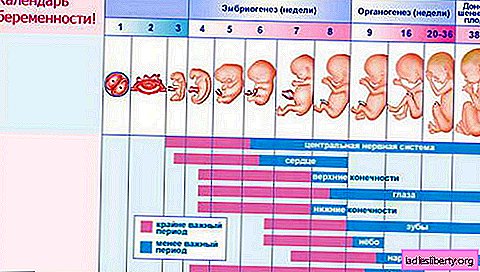
A newborn child has a small set of communication tools with the outside world: crying and screaming. Sometimes the baby begins to groan and push. This worries parents: thoughts arise about the unhealthy baby.
Physiological causes of groaning of a newborn
There may be several reasons for this behavior. In most cases, it is not a sign of illness.
Most often, if a newborn baby groans, the reasons can be, first of all, physiological:
• any discomfort - heat, cold, soiled diaper, uncomfortable clothes;
• binge eating;
• an attempt to regurgitate air entering the stomach during feeding;
• the presence of flatulence - an accumulation of gases in the intestine;
• need for bowel or bladder emptying;
• the formation of dry crusts in the nose, which makes breathing through the nose and oxygen more difficult;
• expression of dissatisfaction or desire to communicate.
Features of the anatomy and physiology of the child
In the newborn, the digestive and urinary systems are not completely developed and their functions are not established. The muscles of the anterior abdominal wall and sphincter of the rectum and bladder are poorly developed. Soft feces do not have to exert pressure on the intestines and do not cause a conditioned reflex to empty it. Therefore, to perform these actions, the child has to strain, while he groans.
When expressing discontent or wanting to chat, a newborn baby groans - the reasons in these cases are inability and inability to express feelings and emotions in a different way.
In those cases when the child groans, but eats well, sleeps calmly at night, does not cry - there is no reason for concern.
Newborn baby groans: pathological causes
If the baby grunts, his face turns red, he cries, bangs his legs - you need to pay special attention to this. This behavior can be a manifestation of intestinal colic:
• with flatulence, there are sharp paroxysmal pains in the abdomen;
• constipation can also cause discomfort and pain.
Signs of constipation in a newborn are:
• lack of stool in a breast-fed baby - more than 3 days,
• a child on artificial feeding - more than 1 day;
• stool dense, solid and fetid;
• the baby strains, blushes and groans even in his sleep, trying to empty his intestines.
Other occasions
If a newborn baby groans, causes, in addition to flatulence and ordinary constipation, may be:
• the condition of the so-called "starvation constipation" when the baby has nothing to empty - there is no feces;
• loss or slow weight gain and severe weakness;
• allergic itching;
• fever.
Constipation and allergies in a baby depend entirely on the mother’s nutrition or on the mixtures that feed him:
• during artificial feeding, in addition to the unsuitable mixture, a problem with the intestines can provoke overfeeding or insufficient water;
• during breastfeeding, the reason is a large amount of white bread, meat, rice, whole milk, bananas in the mother’s diet, as well as the use of allergen products (chocolate, citrus fruits, nuts).
What to do if a newborn baby groans
If the child groans, the physiological cause of this phenomenon must be eliminated:
• Ensure complete comfort - the temperature and humidity in the children's room should not exceed normal values (humidity - at least 60%, temperature - no more than 220 C).
• Make sure that the baby is not very warmly dressed: in a hot room, a wrapped-up child may experience a feeling of heat, accompanied by groaning of the baby.
• To maintain constant humidity in the children's room, it is necessary to do regular wet cleaning, use special humidifiers in the apartment.
• Timely change diapers, make sure that the laundry does not irritate the skin and does not crush.
• Increase swimming time in warm water in time.
• Establish nutrition for the baby and lactating mother: choose a mixture that does not cause allergies when breastfeeding - review the woman’s diet and exclude products that cause allergies and fermentation in the intestines.
• Monitor the condition of the child’s nasal mucosa so that it is not blocked: gently clean it of crusts when the mucous membrane is dry, if necessary, after consultation with the pediatrician, instill the prescribed drops. Aquamaris drops, which have the composition of sea water, are completely harmless.
• Monitor the baby's stool: in infants, it should be 4-5 times during the day, a mushy consistency, yellow or greenish in color with a sour-milk smell. With its change in color, texture, smell, quantity, you need to reconsider the nutrition of the mother and child. If the results are not available or there is a high temperature, vomiting - you need to contact a pediatrician.
When to see a doctor
The reason for contacting a pediatrician are:
• lack of appetite;
• weight loss;
• profuse regurgitation or vomiting;
• constant flatulence;
• unstable chair;
• the appearance in the feces of blood, mucus, foam.
What to do if a newborn baby groans, in such cases the doctor will decide.
What should mom do if a newborn baby groans
If, according to available signs, it becomes clear that the cause of groaning of the baby is increased gas formation, it is necessary to lay the baby on the tummy for 5-10 minutes after each feeding.
It is important in such cases to properly feed the baby: apply to the chest in such a way as to prevent swallowing of air. With artificial feeding, pick up a bottle with a nipple of such a shape so that air does not enter when feeding through the hole in it into the stomach. The hole should be small.
After feeding, the baby should be upright so that it can burp air from the stomach. Then do a circular massage of the abdomen in a circular motion, exercise the legs with a bicycle.
Fighting constipation
If it turns out that the baby is constipated, laxatives or an enema should not be given immediately. The child's body can cope on its own - you need to wait a bit.
To prevent constipation, daily preventive measures should be taken:
• add fermented milk mixture to the child’s diet;
• enrich the menu of a nursing mother with yogurt and kefir;
• give a plentiful drink to the child in the heat and a sufficient amount of water daily;
• after six months to give the baby "laxative" foods: baked apple, beets, prunes;
• clockwise do daily abdominal massage after eating;
• do special exercises with bending and pulling the legs to the stomach.
Pediatrician Tips
If all these actions do not give a quick positive result, you need to contact a pediatrician who will prescribe a laxative. An effective and safe remedy at home is dill water, which is given in a few drops. It is possible to use (as directed by a doctor) Hilak forte, Espumisan, Baby Kalm, Plantex.
You can not take laxatives for a long time or do cleansing enemas. This can lead to problems with bowel movements becoming chronic, and constipation will bother constantly.
Upon examination, the pediatrician may prescribe an additional examination: analysis of feces for dysbiosis. If in the recent past the baby had to take antibiotics for any reason, a violation of the intestinal microflora is the cause of constipation and intestinal colic. When confirming the diagnosis, it will be necessary to take drugs related to probiotics and eubiotics that restore the normal intestinal flora. Symptoms will disappear or decrease significantly.
In some cases, an analysis is prescribed to determine lactase - an enzyme that is produced in the wall of the small intestine and breaks down milk sugar (lactose) into its components - glucose and galactose. With lactase deficiency in a child, milk intolerance occurs - the body cannot process it. This is manifested by various intestinal symptoms (flatulence, constipation or diarrhea) and the appearance of colic, causing anxiety, crying, grunting.
Parents need to be patient - as a rule, by 4-6 months, problems with the intestines will normalize, and the child’s behavior will change. The condition of the newborn, its comfort depends on careful care and increased attention to any changes that occur to him.











